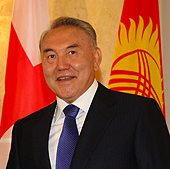The death of around a dozen people over the weekend in Zhanaozen, Kazakhstan, follows months of reported strikes, bombings and other violence in the western part of the country. The exact reasons for the disturbances are unclear. Labor disputes, clan rivalries and resurgent Islamist militancy all seem to be at work. Whatever the causes, Kazakh authorities should heed the warning represented by the violence and ensure that the country’s upcoming legislative elections are free and fair.
On Nov. 16, President Nursultan Nazarbayev dissolved Kazakhstan’s national legislature and established Jan. 15, 2012, as the date for the next parliamentary elections. Since then, the Central Election Commission and all interested parties -- including national and international NGOs, political parties and international organizations such as the Organization for Security and Cooperation in Europe (OSCE) -- have begun preparing for the elections.
The last ballot for both the Majilis (the lower house of parliament) and the Maslikhats (local representative bodies) occurred in 2007. The overwhelming victory of Nazarbayev’s party, Nur Otan, in the August 2007 elections for the national legislature reinforced concerns about the Kazakh government’s commitment to meeting OSCE political standards. The organization expressed similar concerns over irregularities in this year’s presidential election, which saw Nazarbayev re-elected with more than 95 percent of the vote.

